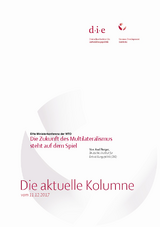The eleventh WTO Ministerial Conference
The future of multilateralism is at stake
Berger, AxelThe Current Column (2017)
Bonn: German Development Institute / Deutsches Institut für Entwicklungspolitik (DIE), The Current Column of 11 December 2017
Buenos Aires, 11 December 2017. This week sees the 164 members of the World Trade Organization (WTO) meet in Buenos Aires, Argentina, for its eleventh Ministerial Conference. The official agenda includes negotiations regarding the removal of agricultural and fisheries subsidies, public stockholding for food, support for small and medium-sized enterprises and new rules for digital trade. Observers anticipate that the WTO members will succeed in making progress in some of these areas. However, bubbling under the surface is a conflict that threatens to split the WTO and with it the multilateral trading system. Ironically it is the USA – without whose support the establishment of the multilateral trading system after the Second World War and the founding of the WTO 22 years ago would not have been possible – that is working to discredit and incapacitate the WTO. Whilst at the G20 Summit in Hamburg in July of this year US President Trump joined the other G20 heads of state and government in acknowledging the ”decisive role of the rules-based system of international trade“, the latest US initiatives indicate that this commitment to the multilateral trading system is of limited duration. Even without the latest attacks from the US, in recent years the WTO has resembled a boxer on the ropes, gradually making its way back into the fight after a number of severe blows. The Doha Round of multilateral negotiations launched with great pathos after the New York terror attacks of 2001 rapidly faltered. The reasons for this are manifold. They range from an (overly) complex negotiating agenda to the need for unanimity and on to the fundamental shift in the global trading system caused among other things by the rise of China. The increasingly sceptical view of globalisation in many societies is also sure to have played a role. As a consequence, many countries are only negotiating half-heartedly in the WTO, instead attempting to further their interests in the context of bilateral or regional trade agreements. Even though a major breakthrough failed to be achieved in the Doha Round, at its previous ministerial conferences in Bali (2013) and Nairobi (2015) the WTO was able to achieve some progress on issues such as trade facilitation and the reduction of agricultural export subsidies. These negotiation successes were important in shoring up the relevance of the WTO and its role as a universally-recognised arbitrator in trade disputes. It is this specific role as arbitrator that is now being attacked by the US. In the Appellate Body, the central appeal body in the WTO dispute settlement system, two of the seven judge posts are currently unfilled. A further position will become vacant at the end of December. As a consequence, the WTO’s dispute settlement system will be limited in its actions, if these positions are not filled soon. By blocking appointments to the posts the US is throwing a spanner in the works of the WTO dispute settlement system, which is currently dealing with over 200 cases. This multilateral dispute settlement system is a particular thorn in the side of trade policy hawks in the current US administration. Their criticism is presently being openly directed at two ongoing cases against Washington and Brussels regarding the status of China as a market economy. China was supposed to have automatically attained the market economy status 15 years after joining the WTO in 2001. In addition to international prestige, Beijing is also keen on using this status to make it more difficult for other countries to impose anti-dumping measures on Chinese products that make it easier to restrict imports from China. The USA, as well as the European Union, still does not recognise China as a free market economy, referring to the extensive market distortions in favour of Chinese exporters. However, whilst the EU is likely to accept a forthcoming arbitration ruling in favour of China, this cannot be expected of the US under the leadership of President Trump. It cannot be ruled out that such a ruling could be used as grounds to announce withdrawal of US membership of the WTO. Following the withdrawal of the US from the Paris climate agreement, this would mark the complete departure of the USA from the multilateral system. It is not to be expected that these fundamental issues regarding the future of multilateralism can be resolved at the eleventh Ministerial Conference in Buenos Aires, which involves 164 countries dealing with a complex, technical agenda. The next opportunity to address these systemic questions at the highest levels with the heads of state and government of the leading economies comes less than 12 months later, at the G20 summit scheduled for the end of November 2018, also in Buenos Aires. However, only if the economically liberal Argentine President Macri is not afraid to put the future of the WTO on the agenda, in the face of the anticipated opposition from Washington. After all, the future of multilateralism in general is at stake.


